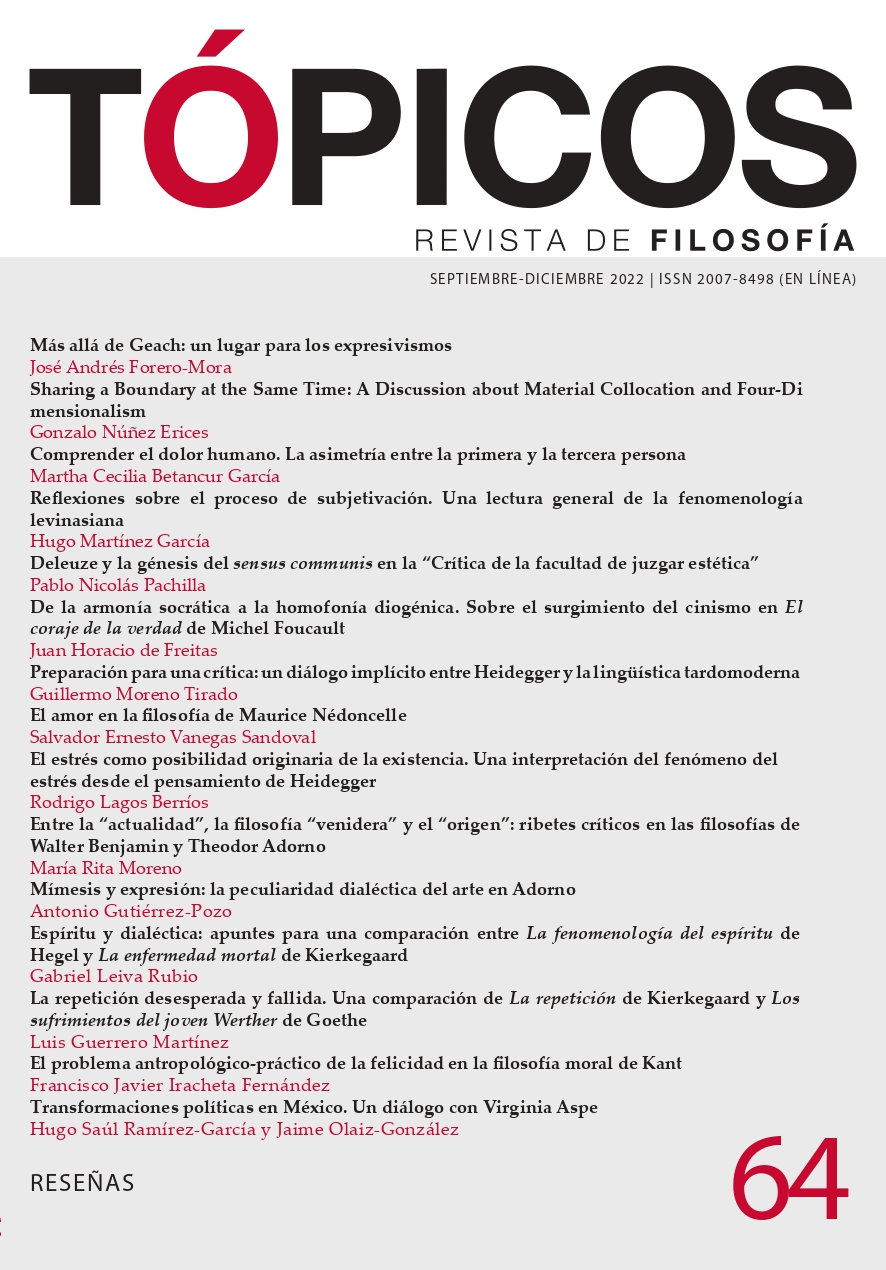Stress as an Original Possibility of Existence. An Interpretation of Stress from Heidegger’s Perspective
Publiée 2022-08-13
Mots-clés
- Heidegger,
- estrés,
- filosofía,
- Dasein,
- psicología
(c) Copyright Tópicos, Revista de Filosofía 2022

Ce travail est disponible sous licence Creative Commons Attribution - Pas d'Utilisation Commerciale - Pas de Modification 4.0 International.
Comment citer
Résumé
This article aims to make a philosophical interpretation of the phenomenon of stress based on Heidegger’s thought. Firstly, I present a general review of the scientific concept of stress as well as the main theories about it. Secondly, the concept of stress in Heidegger’s thought is analyzed and I propose to understand it as a load (Belastung) or requests (Beanspruchungen) that are directed to the Dasein in its openness to the entities of the world. Finally, this shows that the approach to the phenomenon of stress from Heidegger’s phenomenological-existential perspective allows us to overcome the causal and physiological explanations that do not consider stress as a fundamental way of being typical of human beings in so far as they are a Dasein.
Références
- Aho, K. (2018). Existential Medicine: Essays on Health and Illness. Rowman & Littlefield.
- Askay, R. R. (1999). Heidegger, the Body, and the French philosophers. Continental Philosophy Review, 32(1), 29-35. DOI: https://doi.org/10.1023/A:1026403028258.
- Askay, R. R. (2006). La filosofía de Heidegger y sus implicaciones para la psicología: Freud y el psicoanálisis existencial. H. Jordán y J. F. Jordán (trads.). Gaceta Universitaria, 2, 178-186.
- Aurenque Stephan, D. y Jaran Duquette, F. (2018). La enfermedad como rasgo humano. Hacia una consideración de la enfermedad en cuanto fenómeno existencial. Alpha, 47, 161-176. DOI: https://doi.org/10.32735/s0718-220120180004700172.
- Barraza, A. (2007). El campo de estudio del estrés: del Programa de Investigación Estímulo-Respuesta al Programa de Investigación Persona-Entorno. Revista Internacional de Psicología, 8(2), 1-30. DOI: https://doi.org/10.33670/18181023.v8i02.48.
- Bértola, D. (2010). Hans Selye y sus ratas estresadas. Medicina Universitaria, 12(47), 142-143. URL: http://eprints.uanl.mx/id/eprint/8451.
- Caillagua Calero, R. D. C. y Untuña Soria, A. M. (2012). Elaboración de un manual de técnicas y terapias preventivas para tratar el estrés laboral en las secretarías de la Universidad Técnica de Cotopaxi en el período académico 2011-2012. [Tesis de licenciatura]. Universidad Técnica de Cotopaxi.
- Cannon, W. B. (1935). Stresses and Strains of Homeostasis. The American Journal of the Medical Sciences, 189(1), 13–14. DOI: https://doi.org/10.1097/00000441-193501000-00001.
- Clavete, E. y Villa, A. (1997). Programa “Deusto 14-16”. II. Evaluación e intervención en el estrés docente. Mensajero.
- Christian, P. y Lolas, F. (1985). The Stress Concept as a Problem for a ‘Theoretical Pathology’. Social Science & Medicine, 21(12), 1363-1365. DOI: https://doi.org/10.1016/0277-9536(85)90444-7.
- Dastur, F. y Cabestan, P. (2011). Daseinsanalyse. Vrin.
- Fisher, S. (1986). Stress and Strategy. Lawrence Erlbaum Associates.
- Han, B. C. (2017). La sociedad del cansancio: Segunda edición ampliada. A. Saratxaga y A. Ciria (trads.). Herder.
- Heidegger, M. (1988). Zur Sache des Denkens. Max Niemeyer Verlag.
- Heidegger, M. (1997). Estudios sobre mística medieval. J. Muñoz (trad.). Fondo de Cultura Económica.
- Heidegger, M. (2000a). Carta sobre el humanismo. H. Cortés y A. Leyte (trads.). Alianza.
- Heidegger, M. (2000b). Nietzsche I. J. L. Vermal (trad.). Ediciones Destino.
- Heidegger, M. (2007). Los conceptos fundamentales de la metafísica: mundo, finitud, soledad. A. Ciria (trad.). Alianza.
- Heidegger, M. (2013). Seminarios de Zollikon. A. Xolocotzi (trad.). Herder.
- Heidegger, M. (2017). Ser y tiempo. J. Rivera (trad.). Universitaria.
- Herbert, J. (1997). Fortnightly Review: Stress, the Brain, and Mental Illness. BMJ, 315(7107), 530-535. DOI: https://doi.org/10.1136/bmj.315.7107.530.
- Hipócrates. (1983). Tratados hipocráticos. I. C. García, M. De Lara, J. López y B. Cabellos (trads.). Gredos.
- Holmes, T. H. y Rahe, R. H. (1967). The Social Readjustment Rating Scale. Journal of Psychosomatic Research, 11(2), 213–218. DOI: https://doi.org/10.1016/0022-3999(67)90010-4.
- Johnson, F. (2014). Cuerpo y método: el planteamiento heideggeriano del problema de la corporalidad en Zollikoner Seminare. Ideas y Valores: Revista Colombiana de Filosofía, 63(155), 7-30. DOI: https://doi.org/10.15446/ideasyvalores.v63n155.32904.
- Lagos Berríos, R. (2020). Heidegger y la cuestión del cuerpo en Ser y tiempo: buscando el lugar del cuerpo en la analítica existencial del Dasein. Límite: Revista Interdisciplinaria de Filosofía y Psicología, 15, 1-16. DOI: https://doi.org/10.4067/s0718-50652020000100203.
- Lazarus, R. y Folkman, S. (1986). Estrés y procesos cognitivos. M. Zaplana (trad.). Martínez-Roca.
- López, J., Ortiz, T. y López, M. (1999). Lecciones de psicología médica. Masson.
- Maldonado, M. D. (2000). Programa de intervención cognitivo-conductual y de técnicas de relajación como método para prevenir la ansiedad y el estrés en alumnos universitarios de enfermería y mejorar el rendimiento académico. Cuadernos de Medicina Psicosomática y Psiquiatría de Enlace, 53, 43-57.
- Neufeld, R. W. J. (1989). Methodological aspects of laboratory studies of stress. En R. W. J. Neufeld (ed.), Advances in the Investigation of Psychological Stress. (pp. 71-132). Wiley.
- Nietzsche, F. (2000). La voluntad de poder. A. Froufe (trad.). EDAF.
- Nietzsche, F. (2003). Así habló Zaratustra. A. Sánchez Pascual (trad.). Alianza.
- Orlandini, A. (1999). El estrés, qué es y cómo evitarlo. Fondo de Cultura Económica.
- Selye, H. (1936). A Syndrome Produced by Diverse Nocuous Agents. Nature, 138(3479), 32-32. DOI: https://doi.org/10.1038/138032a0.
- Selye, H. (1976). The Stress of Life. McGraw Hill.
- Selye, H. (1993). History of the Stress Concept. En L. Goldberger y S. Breznitz (eds.), Handbook of Stress. Theoretical and Clinical Aspects. The Free Press.
- Svenaeus, F. (2011). Illness as Unhomelike Being-In-The-World: Heidegger and the Phenomenology of Medicine. Medicine, Health Care and Philosophy, 14(3), 333-343. DOI: https://doi.org/10.1007/s11019-010-9301-0.
- Torrades, S. (2007). Estrés y burn out: definición y prevención. Offarm: Farmacia y Sociedad, 26(10), 104-107.
- Weiner, H. (1992). Perturbing the Organism: The Biology of Stressful Experience. University of Chicago Press.
- Xolocotzi Yáñez, A. (2008). Los encuentros de Heidegger con la psiquiatría: Badenweiler y Zollikon. La Lámpara de Diógenes: Revista Semestral de filosofía, 9(16), 7-23. URL: http://www.ldiogenes.buap.mx/revistas/16/7.pdf.





